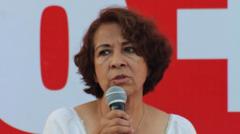The article recounts the heart-wrenching experiences of young Sudanese—Hafiza, Mostafa, and Manahel—who, armed with smuggled phones, reveal the brutal realities of their lives amid the ongoing civil war in Sudan, illustrating both their losses and valiant efforts to support their communities.
**Despair and Resilience in El-Fasher: The Voices of Sudan's Youth Amidst Civil War**

**Despair and Resilience in El-Fasher: The Voices of Sudan's Youth Amidst Civil War**
A grim portrayal of life under siege in Sudan's Darfur region, as youth document their struggle for survival.
In the beleaguered city of el-Fasher, Sudan, three young individuals have emerged as poignant chroniclers of life amidst war, all due to a unique initiative by BBC World Service, which smuggled in phones to help reveal the grim circumstances faced by those trapped in conflict. Two years into a devastating civil war, the landscape has transformed into a battlefield, with the city enduring relentless attacks and critical shortages.
Hafiza, a 21-year-old, captures her harrowing journey after her mother’s death during a shell strike on a market in August 2024. Her narrative details the immediate burdens thrust upon her as she becomes the primary caretaker for her younger siblings after losing both parents to the ongoing violence. The city, largely cut off from the rest of the world, faces grave humanitarian crises, as brutal conflicts between the Sudanese army and the paramilitary Rapid Support Forces (RSF) have incited severe devastation.
In her poignant video messages, Hafiza expresses the pervasive grief and struggles to adapt to her new reality. “I spend my time crying alone at home,” she shares, revealing her overpowering sense of loss as she grapples with the responsibilities of providing for her family amidst chaos. The RSF's grip on el-Fasher has added an extra layer of peril, complicating escape and humanitarian efforts.
Mostafa, 32, also allocated a phone, depicts the constant threat of artillery fire and shelling that defines daily life. “Death can strike anyone, anytime,” he candidly reflects as he narrates his experiences hiding from incessant violence while volunteering in a shelter for displaced families. The precarious conditions of el-Fasher, with looted homes and contaminated water sources, paint a stark picture of the city’s plight.
Manahel, a 26-year-old who recently graduated in law, highlights the community’s resolve by engaging in volunteer work to support those displaced. Despite escalating violence, she is determined to provide sustenance to those in shelters, understanding that the meals she cooks might be the only daily nourishment for many impoverished families. However, she too faces uncertainty after losing her father during a bombardment.
As these young voices resonate through the BBC's reportage, the glaring disparities between the lived realities of those in el-Fasher and the narrative propagated by the RSF reveal the deepening chasm of understanding in this conflict. The RSF, which has been accused of numerous war crimes, continues to maintain control over the narrative while denying accusations of ethnic cleansing, despite harrowing testimonies from survivors in displaced person camps.
The situation escalates further with concerns of famine looming as the UN reports troubling food shortages threatening to exacerbate the humanitarian crises in el-Fasher. Moreover, fears of sexual violence among women in the growing chaos deepen, particularly as stories from other parts of Sudan reveal horrifying accounts of ethnic-targeted violence, leaving Hafiza and many like her to live in fear.
With an avoidable humanitarian catastrophe unfolding, the ongoing struggle witnessed through the lenses of Hafiza, Mostafa, and Manahel lays bare the urgent need for recognition and intervention. As the war continues, the innocence of youth in Sudan is irrevocably altered, with hopes of returning home fading into uncertainty amid a backdrop of warfare and despair.
Despite this, their resilience and determination to support one another amidst tragedy mark a beacon of hope within a fractured society seeking peace. The battle for survival continues, but so too does the yearning for an end to the violence that has gripped Sudan for far too long.






















